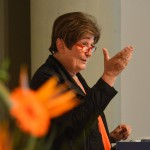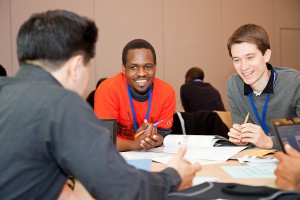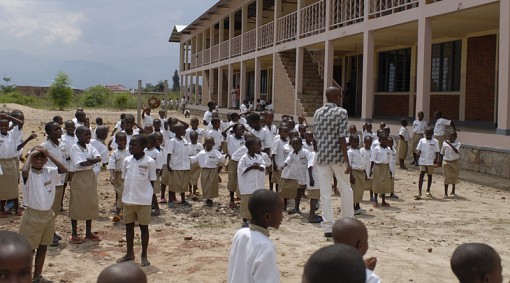DAAD has been funding the “Development-related Postgraduate Courses” programme for 25 years now – a perfect time to celebrate and take stock. The second day of the anniversary conference held in Bonn was devoted to evaluating the programme and considering its future.
 Recalling when the DAAD began establishing its first degree programmes with partner universities in developing countries, DAAD Secretary General Dorothea Rüland commented: “At that point, Bologna was just a city in Italy.” The programmes were ahead of their time, espousing the ideas that Bologna Process later came to stand for: Cross-border cooperation among higher education institutions for internationally recognised Master’s degrees, courses taught in English and a greater push for inter-cultural exchange among students.
Recalling when the DAAD began establishing its first degree programmes with partner universities in developing countries, DAAD Secretary General Dorothea Rüland commented: “At that point, Bologna was just a city in Italy.” The programmes were ahead of their time, espousing the ideas that Bologna Process later came to stand for: Cross-border cooperation among higher education institutions for internationally recognised Master’s degrees, courses taught in English and a greater push for inter-cultural exchange among students.
44 postgraduate courses and over 6,000 scholarship holders
The “Development-related Postgraduate Courses” programme for specialists and professionals from developing and transition countries was launched in 1987 with initially six course of study. Ten years after the programme’s inception, the number had risen to 20. Today, this number has more than doubled, making for a total of 44 degree programmes.
Over the years, the programme has funded approximately 6,000 young women and men. The completion rate is well over 90 percent. With a return rate of more than 70 percent, the number of programme graduates who return to their home countries is remarkably high.

Several employers
These figures are taken from a series of studies commissioned by the DAAD since 1998. The surveys also track the career development of the programme’s alumni. How do the scholarship holders’ careers develop after graduating? More than half of all the programme’s alumni from some 135 countries responded to the survey. The study shows that 45 percent of all DAAD scholarship holders return to their previous employers after completing their programmes in Germany. As for the others, they find new jobs through standard application processes (25 percent), personal contacts (12.5 percent) or through contacts in Germany (nearly 10 percent).
“We are noticing here the effects of modernisation,” says Michael Golba, scientific director of the alumni study and presenter of the study in Bonn. “In more developed countries, the alumni are less likely to stay with the same employer.” Lifelong employment with a single employer is on the decline and this general societal trend is also visible among graduates of the “Development-related Postgraduate Courses” programme.
Long-term study planned
 Another long-term study presented during the Bonn conference, also commissioned by the DAAD and conducted by researchers from the Technische Universität Dortmund, will provide a detailed assessment of the impacts of the programme until 2023. In addition to quantitative analyses, the study will also feature the biographies of a select group of scholarship holders from various countries, who, for the purpose of the study, have been tracked over the course of several years. What was their education before entering the programme? What are the motivations, impulses and background information driving their career moves and life choices? How mobile and interconnected are the scholarship holders and how has this been influenced by their time in Germany?
Another long-term study presented during the Bonn conference, also commissioned by the DAAD and conducted by researchers from the Technische Universität Dortmund, will provide a detailed assessment of the impacts of the programme until 2023. In addition to quantitative analyses, the study will also feature the biographies of a select group of scholarship holders from various countries, who, for the purpose of the study, have been tracked over the course of several years. What was their education before entering the programme? What are the motivations, impulses and background information driving their career moves and life choices? How mobile and interconnected are the scholarship holders and how has this been influenced by their time in Germany?
Focus on water, energy, education and business
The purpose of the studies is to identify ways to develop and improve the programmes’ various courses of study. “Our goal is to provide the degree programmes with valuable feedback,” says Carola Bauschke-Urban, one of the project heads. After all, as instruments for enabling people from around the world to tackle global challenges, the postgraduate courses must remain flexible and adaptable. Over the course of its 25 years, the scope of the postgraduate course programme has expanded significantly. The degree programmes have shifted focus away from purely academic fields and toward a more thematic approach that embraces global issues, such as water and energy supply, education and business.
Workshops: Shaping the future
Another valuable source of forward-thinking input for the postgraduate courses were the workshops held during the conference. Climate change, for example, was identified as a topic that should be handled across the entire programme of development-related courses. “In our workshop we talked about ways in which climate change affects farming, tropical forest and cities,” says Olaf Horstick, coordinator of the International Health programme at Heidelberg University. The discussion revealed the complexity of the issue. “Expertise and inter-disciplinary skills are needed in equal measure if we are to tackle the consequences of climate change in the future,” says Lars Ribbe, programme chair at the Cologne University of Applied Sciences. Workshop participants suggested that institutions join forces to develop flexible course modules on climate change that could be shared by multiple Master’s programmes.
For DAAD Secretary General Dorothea Rüland, this kind of deep-dive work on the programmes itself is just as important as the programme’s overall mission: “While the postgraduate courses help bring about change in the world, they also provide the programme with new ideas that keep it moving forward.”
Travelogue Itinerary Bonn:
Creating a new world






